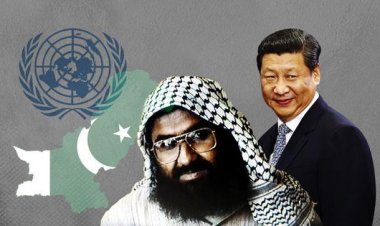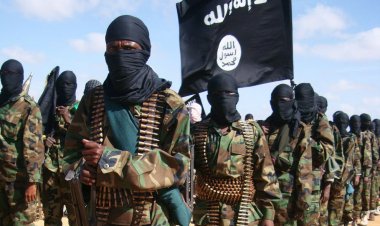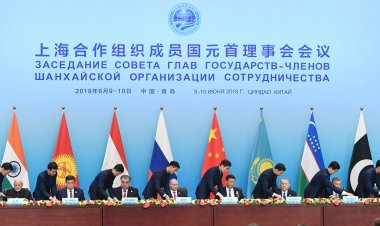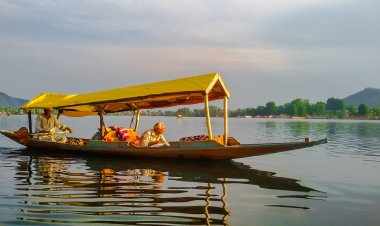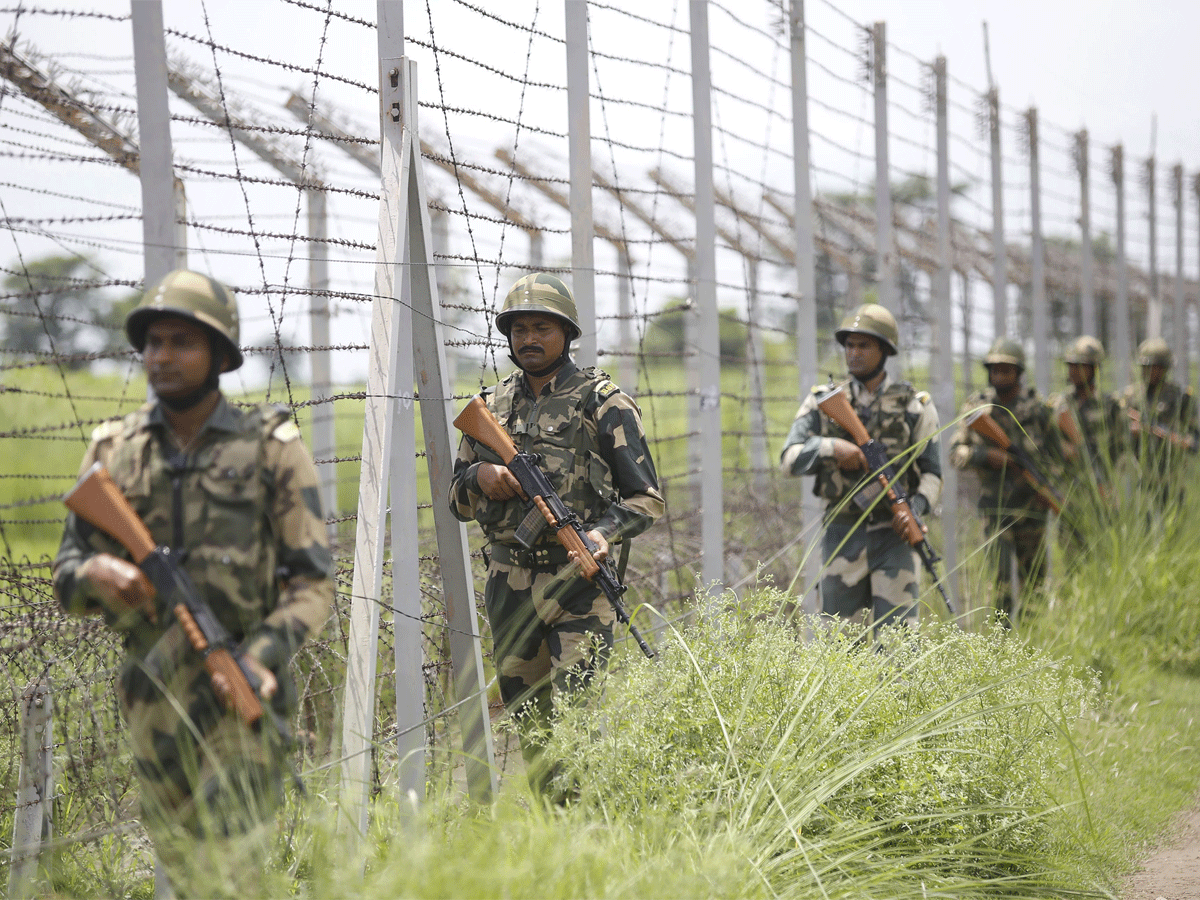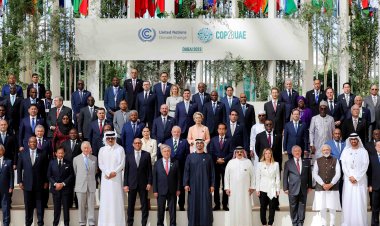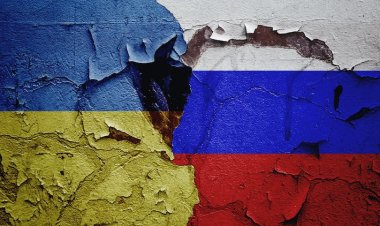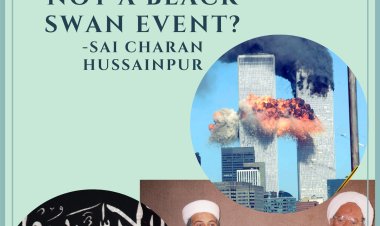The Future of QUAD in Indo Pacific Security Order
On March 21st, 2021, Usanas Foundation organized a webinar discussing Quad’s relevance to Indo-Pacific Security Order in the Post Pandemic World. The session was joined by some of the most eminent and influential voices around the world.
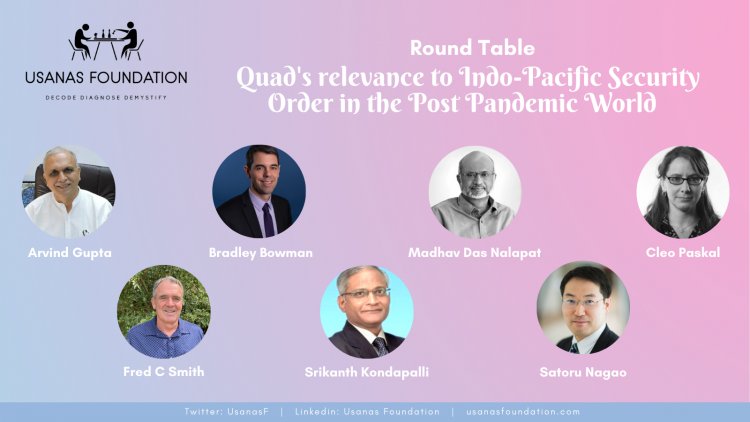
Webinar Report
By Usanas Foundation
On March 21st, 2021, Usanas Foundation organized a webinar discussing Quad’s relevance to Indo-Pacific Security Order in the Post Pandemic World. The session was joined by some of the most eminent and influential voices around the world, including Dr. Arvind Gupta, Mr. Bradley Bowman, Mr. Madhav Das Nalapat, Ms. Cleo Paskal, Mr. Srikanth Kondapalli, Dr. Satoru Nagao, and Mr. Fred C. Smith. The event was moderated by our CEO Mr. Abhinav Pandya and valuable closing remarks were provided by Ambassador Anil Trigunayat.
The first meeting of Quad Summit 2021, involving the top leaders of the four-member countries of India, Australia, Japan, and the US, raised some crucial questions on how Indo-Pacific countries can protect the rules-based world order. With reference to that, the session aimed to explore the relevance and future of Quad to the Indo-Pacific security order, India’s role in this scenario, and ways to counter the aggressiveness of China in the Indo-Pacific region. Mr. Abhinav Pandya started the session by introducing all the speakers and giving a glimpse of the issues to be discussed.
Dr. Arvind Gupta, Director of Vivekananda International Foundation began his address by discussing how following the Quad’s meeting, Biden administration's opinions have become clearer on the Indo-Pacific policy. He also added how other countries are also watching these developments with great interest. He added, “We are at the inflection point. Quad is going to be an important institution. This is going to be characterized by acute comprehensive competition on all fronts- political, economic, technology, trade, and so on, and all these are interlinked.”
“Last century we had a cold war but it was a different kind of competition. If you want to describe acute strategy competition as cold war 2.0 then probably that’s what we are entering into but this will have new features.”
Dr. Gupta then discussed that Quad is becoming a much larger issue than just a simple quadrilateral security dialogue. Security definitely remains essential, but more issues such as Vaccine diplomacy and Quad plus are being considered. European countries, including the UK, are also tilting towards the Indo-Pacific. He further argued, “But all these are intentions, a lot of consensus and convergence needs to be developed, which hasn't yet happened.” He stated that US-China tensions are going to rise. “These will provide a lot of options for many countries and most importantly ASEAN, as it has previously shown disinterest in choosing sides between the US and China. We will have to wait and watch how other countries react.”
Further, he discussed India’s options and positions with regard to the issue. “India is much more confident of dealing with China and is dropping its hesitations.” He stated that India wants to enlarge its cooperation with the US in all areas.
Mr. Madhav Das Nalapat, Editorial Director of Sunday Guardian and News X and Advisory Board Member of Usanas Foundation discussed the future of the US-India synergy in the QUAD under Modi and Biden. Mr. Nalapat argues, “Cold war 2.0 is shorthand to describe what is taking place which is the battle of systems with the US on the one hand and China on the other, just as there was the battle of systems between the USSR and the US. And the Chinese system is definitely not the American system.” According to him QUAD didn’t come up because India, US, Japan, or Australia wanted to set a formation, it came up because of the circumstances, and these circumstances in his view are propelling India in a particular direction.
“China has made a choice, that choice is the military of a country. That military is not India friendly, China has taken their decision and that closes certain options for us (India) and therefore there would be a much more limited series of options.” He continues, “They had a clear line on India and that line has been friendly to the Pakistani military quite openly.”
He also said, “ASEAN will be looking very carefully at QUAD, specifically at US-India alliance and seeing whether this is a genuine alliance or just a flash in the pan and whether these countries have the will and stomach to understand what is spacing them and to go through with them.”
Supporting the decision of PM Modi to ban the Chinese apps, he said that decoupling is a reality that we must all accept. He also added that technology is the most important component of warfare which is currently being used by China. He pushed upon two important points, that QUAD is here to stay and Cold war 2.0 is going on.
Next, Mr Bradley Bowman, Senior Director at Center on Military and Political Power at the Foundation for Defence of Democracies argued, “There will be problems in the East and South China Sea if our four countries don't stand together and push back on the aggression from Beijing.” He views the threat coming from Beijing in coming decades as a formidable one. He adds, “I share professor Nalapat’s respect for the Chinese people. Unfortunately, they don't have the kind of government they deserve, they have an oppressive government that seeks to maintain power rather than serving the interest of the people.” He discussed how the stake of the competition is very high today. It's not the US versus China, it’s the world's leading democracy versus leading authoritarian power. The outcome of this competition is going to determine who has an outside influence in setting the rules and norms in the international system. Further, he discusses how the challenge of Chinese military aggression is going to be so robust that no one country, no matter how powerful, can effectively deal with it alone. “It's in all of our national interests to work more closely together because we don't see this as a counter China coalition, it’s not about what we are against, it is about what we are for”.
Mr. Bowman then used the metaphor of the ‘Bully in a playground’ to explain his case, “You don't deal with the bully one-on-one because you are going to get beaten up. You get all the good guys together and you say knock it off, you mess with one of us you are going to mess with all of us.” He pushed on the point that good guys need to have the best weapons to maintain a free, open, and inclusive Indo-Pacific and make Beijing realize that it cannot fulfill political objectives with military aggression.
Cleo Paskal, Associate Fellow at Chatham House explained how Europe will look at the rise of QUAD. She talked about the two main European powers looking at getting into the QUAD- UK and France. She added that there are various countries that are interested in but for various reasons may not fit. “But you don’t want to lose them from this architecture that’s being developed in this global division that’s happening.” Another possibility she recommended was of Indo-pacific Charter. These countries can enter the Indo-Pacific charter which is an updated version of the Atlantic Charter of 1941 which describes the ways of creating rules, norms, and behavioral characteristics that are acceptable for free and open Indo-Pacific. “If Quad is how you fight then the Indo-Pacific charter is why you fight.”
Next, she addresses the issue of anti-QUAD in form China, Pakistan, Iran, Turkey, and Russia. “They would be coming together with or without the QUAD, you know they have overlapping areas of interest”. She concluded by saying that creating trust among the QUAD and keeping it is going to be imperative in moving forward.
Further in the discussion, Mr. Fred C. Smith, Lecturer of Intelligence and Strategic Security Studies, Macquarie University and Captain (Retired) United Nations Navy addressed Australia’s concerns, commitment, and vision for QUAD. He explained, “ PM Abe was the chief architect initially for the QUAD and Australia was also on board.”
Dr. Srikanth Kondapalli, Former Chairman of the Centre for East Asian Studies, SIS, JNU, and member of Advisory Board, Usanas Foundation explained how China is going to react to QUAD, will it inspire more aggression from China or will it mellow down, and how will China deal with India the key pillar of QUAD following the nine-month-long standoff. He added that the Chinese perceptions have been negative and the Chinese foreign minister has been in opposition to the QUAD and also called the QUAD ‘Indo-Pacific NATO’.
Next, Dr. Satoru Nagao shared his thoughts on Japan’s vision of QUAD and how Japan will emerge from its decade of pacifism in case this alliance takes a military level. Further, he discussed that countries like Japan, Australia, India, Vietnam, the Philippines, and South Korea have been increasing their arsenal to strike and the possible reason for this may be that China has been aggressive in expanding its territorial claim since the end of 2000s and now it has escalated. He also stated that China has increased its activities against India as well as Japan over the last decade. Countries around China, said Dr. Nagao needs to reduce China’s overconfidence in its military capability to deter its territorial expansion and the most effective method would be making China defend at multiple fronts. “To deter China’s expansionism all QUAD countries- US, India, Australia, and Japan will have to possess long-range strike capability.
In the end, the closing remarks were presented by Ambassador Anil Trigunayat where he conveyed his gratitude to all the distinguished speakers of the event and complimented them for an exceptionally comprehensive and enlightening session.
Disclaimer: All opinions expressed in the webinar belong to the speakers and are not reflective of Usanas Foundation.

